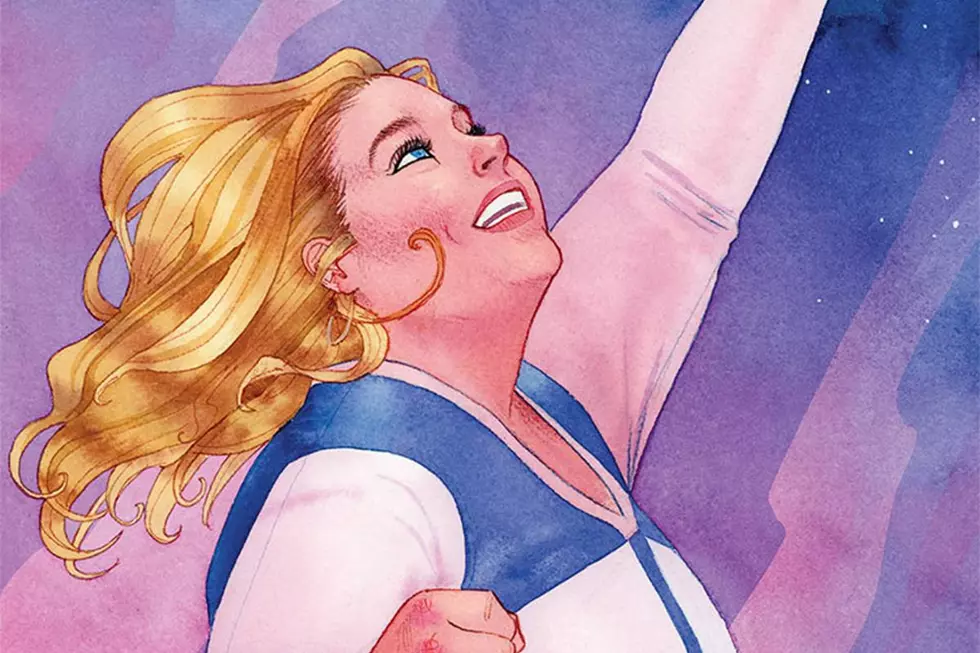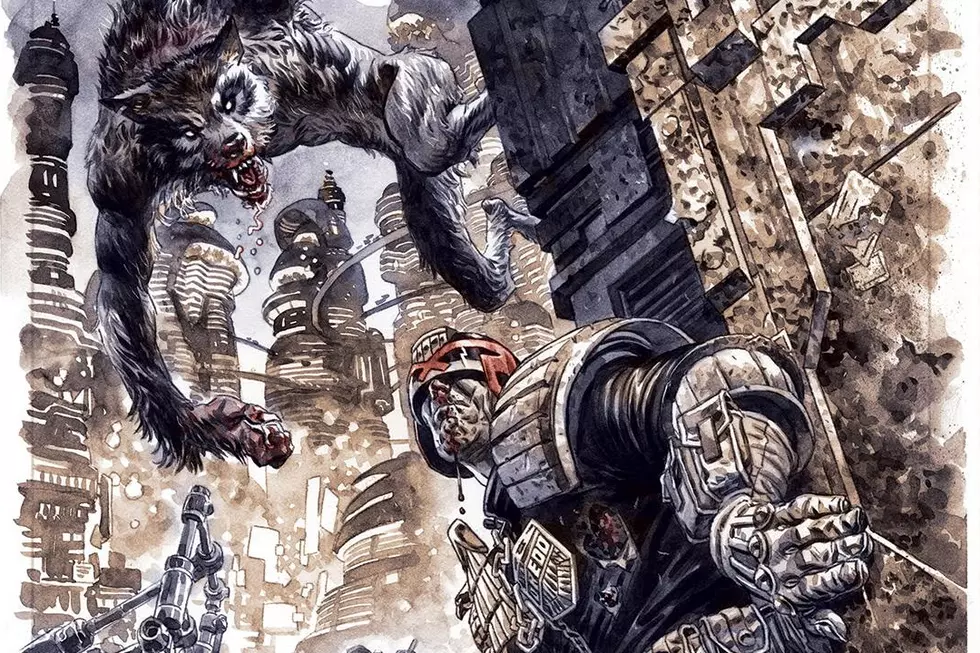
Buy This Book: ‘Dredd: Underbelly’
Even though it suffered from a critical lack of Batman and villains who had purchased nuclear submarines under false names, 2012's Dredd still ranks as one of my favorite comic book movies. The second attempt at translating 2000 AD's long-running character to the screen brought a great cast into a story of brutal action and thrilling adventures through one of Mega City One's massive blocks, and left me -- along with a lot of other fans -- hoping that we'd get to see more of that world soon.
Well, we're still waiting for a sequel, but this week, we got the next best thing. With Dredd: Underbelly, Arthur Wyatt and Henry Flint are telling a story set in the world of the film, where Dredd and Anderson face down a sinister operation behind a new drug on the streets of Mega City One. And if you liked the movie, you're probably going to want to pick up this comic.
The biggest flaws in Underbelly are the same flaws in the original film, which is that when you get right down to it, it's a pretty straightforward, generally humorless action story. The Dredd of the comics has always been rooted in equal parts action and satire, with plenty of dark comedy thrown in for good measure. The movie -- in what I suspect was an attempt to get as much distance as it possibly could from the first attempt, in which Rob Schneider yukked it up inside a spaghetti robot -- mostly moved away from that and more into gritty violence. And to be honest, that really worked on the screen.
For all the comparisons that it got to the "cops fighting their way up a single building against overwhelming odds" structure of The Raid: Redemption, a film where the plot can be summed up as kick kick stab kick stab stab kick stab kick, the narrowed focus did Dredd a lot of favors. 37 years of Dredd stories have given us a lot of stuff to work with, and the movie did a great job of telling a simple story that wouldn't overwhelm new viewers while also including just enough of the things that make Judge Dredd fun and unique to tease a much larger, stranger world. Mutants, psychics, block wars, the Cursed Earth, it all gets enough of a mention that Dredd felt true to the source material without having to dive headfirst into the whole franchise.
It also didn't hurt that Karl Urban is basically amazing at scowling. Seriously, did he have to train for that or what? Was it someone's job to disappoint Karl Urban three times a day in the months before they started shooting? How many times can you drive up to a Chuck E. Cheese only to reveal that you're actually shopping for new school shoes next door before he's onto the ruse? Whatever it was, it worked. Anyway.
Point being, it creates an interesting take on the source material, and when you import that aesthetic back into comics, it makes for an interesting challenge. How do you do a comic based on a movie based on a comic without feeling like you're continually watering down the story? For Wyatt and Flint, the idea seems to have been taking a similar story and adding in a few more elements from the comics, expanding the universe in small steps while still keeping the core intact. And like the movie, it works.
Following up on a movie where the primary McGuffin was "Slo-Mo," a drug that lent itself well to cinematic special effects, Underbelly finds Dredd and Anderson tasked with dealing with a new drug called Psych. The trick this time is that it's an addictive high that also gives its users brief flashes of the future, which means that like its big-screen predecessor, it's a drug that works well in its medium. Instead of slowed-down action and VFX, you get panel layouts designed to show the shuffling timeline, snapping back without warning in a way that's interestingly jarring the first time it happens.
In order to manufacture the drug, the villains -- a pair of scientists who have the charmingly cliché and hilariously doofy names of "Beauty and the Beast" -- are using a work force of mutants scammed into paying for passage over the border from the Cursed Earth. It's a plot point that does double duty, allowing Wyatt and Flint to indulge in a little satire while they're also chipping away at the movie's ultra-narrowed focus, showing a little bit of the world that exists in the post-nuclear wasteland outside Mega City One's walls.
Like I said, it's a very straightforward story. Creeps do future crimes, Dredd and Anderson track them down and, spoiler warning, creeps are dispatched in an imaginatively painful fashion. It might even be a little too straightforward, but that's also the nature of doing the story as a 30-page one-shot, although the story ran in two parts last year in Judge Dredd Megazine. The thing is, Wyatt and Flint do all they can to cram interesting bits and pieces into the story without turning into something that's too complicated for the format, like one of my all-time favorite tricks, the widescreen cutaway:
And, let's be honest here, if you come away from both Dredd and Underbelly wanting to see longer, more complicated stories with these characters, it's not like there aren't options. Which, I think, is the entire point of Underbelly.
The end result is an incredibly entertaining balancing act from Wyatt and Flint as they attempt to recreate the feel of the movie while providing a bridge to more adventures in the comics. It's not really a coincidence that the acts are broken up and bookended by ads for 2000 AD, Judge Dredd Megazine and the Complete Case Files paperbacks, along with the campaign to get a sequel going. The unspoken message here is that if you like Dredd, even if it's just the movie version, there's more out there with this character that you can enjoy. On that front, it does exactly what it sets out to do.
And it does it by doing exactly what this sort of book should do: Not just by translating the aesthetic and drawing the more "realistic" costumes of the film, but by telling a solid, accessible story that incorporates elements hinting at those larger adventures, setting the stage for a transition back to the source. It's worth mentioning that this is the first time 2000 AD itself has ever produced an American-format comic for the direct market, rather than sticking with their usual magazine-style anthologies. They're clearly attempting to go all out with it, capitalizing on the success they've got from the second wave of Dredd movie fans that are coming in from the movie being available on Netflix and DVD. Between this, the continuing quality of the main Dredd stories and the American Dredd titles from IDW, they're doing their best to make themselves accessible to anyone who might become a new fan.
It helps that they throw a few jokes back into it, too.
More From ComicsAlliance
![Judge Dredd Takes On Fairlyhyperman In ‘The Cape & Cowl Crimes’ [Preview]](http://townsquare.media/site/622/files/2017/03/Dredd00.jpg?w=980&q=75)
![The Law Returns To The Moon In ‘Judge Dredd Annual 2017′ [Preview]](http://townsquare.media/site/622/files/2017/02/Dredd00.jpg?w=980&q=75)


![The Best Dark Horse Comics Covers of 2016 [Gallery]](http://townsquare.media/site/622/files/2017/01/featured.png?w=980&q=75)



![The Justice Department Offers Up A Holiday Bribe In ‘2000 AD’ #2011 [Preview]](http://townsquare.media/site/622/files/2016/12/Dreddmas00.jpg?w=980&q=75)
